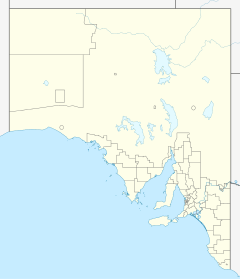Beltana Station
30°41′14″S 138°09′24″E / 30.687176°S 138.156742°E
Beltana (or Beltana Station) is a pastoral lease in the Australian state of South Australia which operates as a sheep station. Established in 1854, it now covers an area of 1,574 square kilometres (608 sq mi) on land located between Lake Torrens in the west and the Flinders Ranges in the east, about 475 kilometres (295 mi) north of the state capital of Adelaide.
History
[edit]The area was first established for pastoralism by John Haimes in 1854 and then surveyed by John McDouall Stuart in 1855.[1] In 1862 the property was acquired by Robert Barr Smith along with the flock of 17,705 sheep that the property was supporting.[2]
Thomas Elder took over lease no. 370 in 1862 forming Beltana Station and until the early 20th century there were as many as 60 living on the station.[3] Beltana Pastoral run for many years was the head station of the Beltana Pastoral Co. The station ran livestock, and a camel breeding programme for work on the Australian Overland Telegraph Line between Adelaide and Darwin, exploring and its own use.[4] It provided living quarters for the "Afghan" cameleers who managed the camels.[5]
21st century
[edit]On 26 April 2013, the land occupying the appropriate extent of the Beltana pastoral lease was gazetted by the Government of South Australia as a locality under the name Beltana Station. The word "station" was added to the locality’s name to distinguish it from the bounded locality and the government town of Beltana.[6]
On 18 Oct 2017, the station with an area at the time of 1,541 square kilometres (595 sq mi) was sold at auction for A$8.4 million to South Australian pastoralist and Yadlamalka Station owner Andrew Doman.[1] The property holds up to 8,500 livestock and offers 4WD driving tracks and accommodation.[7] Paul and Karen Ellis of Camel Treks Australia relocated to Beltana Station in 2018.[8] As of 2018[update], it covers an area of 1,574 square kilometres (608 sq mi) on land located between Lake Torrens in the west and the Flinders Ranges in the east, about 475 kilometres (295 mi) north of the state capital of Adelaide.[9][6][10]
Heritage listing
[edit]The historic Beltana Station Homestead is listed on the South Australian Heritage Register.[11]
See also
[edit]References
[edit]- ^ a b Dayman, Isabel; Reid, Khama (18 October 2017). "Beltana Station sold to South Australian pastoralist for $8.4 million at auction". ABC News. Australian Broadcasting Commission. Retrieved 19 February 2018.
- ^ "Beltana Station". Flinders Ranges Research. 2014. Retrieved 25 May 2014.
- ^ "Interpreting Beltana's History, interpretative signs around the town". Heritage South Australia, Government of South Australia. 2006. Archived from the original on 19 September 2006. Retrieved 10 September 2006.
- ^ "Communities - Beltana". Outback Areas Community Development Trust. 2003. Archived from the original on 29 August 2007. Retrieved 10 September 2006.
- ^ "Afghan cameleers in Australia". australia.gov.au. 15 August 2014. Archived from the original on 15 August 2014. Retrieved 2 June 2019.
- ^ a b "Search result for ' Beltana Station, LOCB' with the following datasets selected - 'Suburbs and Localities', 'Local Government Areas', 'SA Government Regions' and 'Gazetteer'". Location SA Map Viewer. South Australian government. Retrieved 17 February 2018.
- ^ "Beltana Station". about-australia.com. Archived from the original on 27 September 2007. Retrieved 10 September 2006.
- ^ "Our Location". Camel Treks Australia Pty Ltd. Retrieved 19 February 2018.
- ^ "Pastoral Lease Assessment Technical Manual" (PDF). Department of Environment and Natural Resources. 26 August 2011. p. 5. Archived from the original on 17 February 2018. Retrieved 17 February 2018.
- ^ "Search result for 'Beltana Station, LOCB' with the following layers selected - 'Suburbs' and 'Pastoral Stations'". Nature Maps. South Australian government. Retrieved 14 October 2019.
- ^ "Beltana Station Homestead". South Australian Heritage Register. Department of Environment, Water and Natural Resources. Archived from the original on 16 February 2016. Retrieved 12 February 2016.

